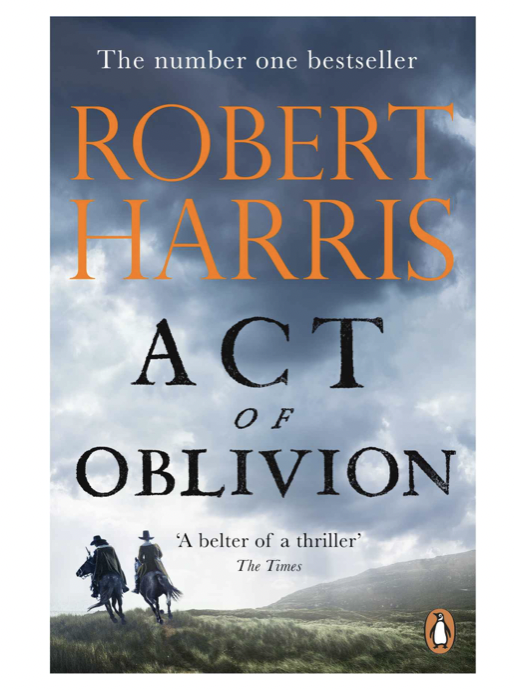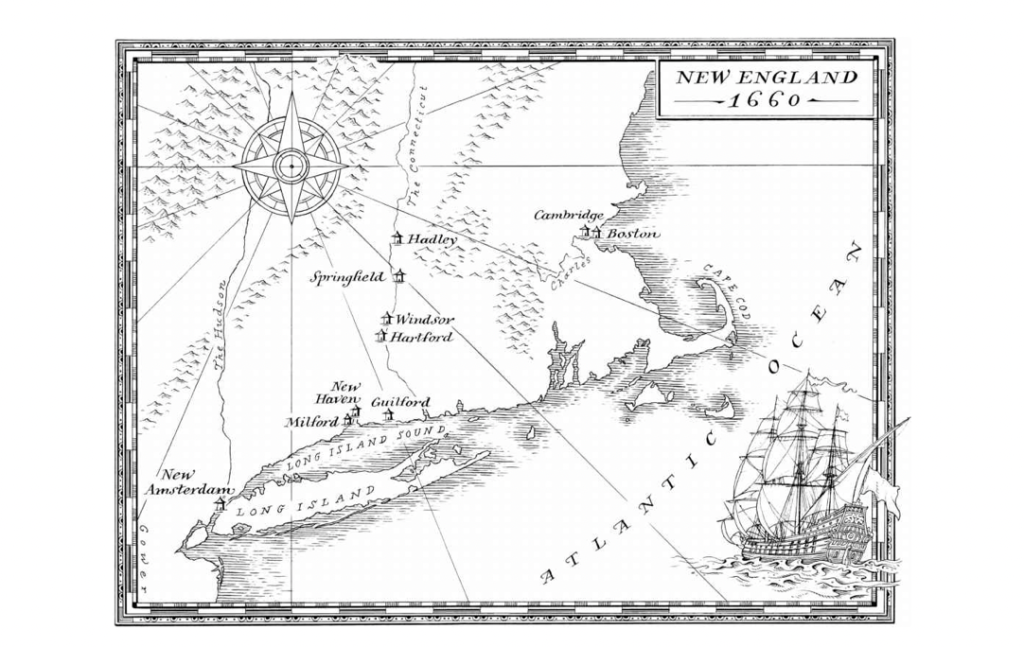Book Club Review
“Act of Oblivion” by Robert Harris, was our most recent Book Club pick. Read on for my review.

Set in 1660, after eleven years of catastrophic Civil War in England, the story finds Colonel Edward Whalley and his son-in-law Colonel William Goffe fugitives from justice. They flee to America, and so the hunt begins. When the Act of Oblivion which the title refers to is passed, those responsible for the regicide of Kind Charles I are tried in absentia and found guilty. Richard Nayler, a dogged, dour, somewhat bitter civil servant, is charged with the task of finding the two men and bringing them back to England to face execution.
Robert Harris (“Enigma”, “ Pompeii”, “Fatherland”) is a hugely successful and experienced writer of historical fiction and thrillers and it shows. The author leads us through a fast paced, detailed, historically atmospheric story, always in control of his material, a master storyteller at the height of his powers. Quality assured, there are two aspects of this book that I’m going to look at here, for no other reason than that I find them extremely interesting.
The first is the challenge of writing a fictional account of historical events. As a writer of historical fiction myself, this is something I often wrestle with/enjoy (depending on the day and the book!) and so I am fascinated to see how other writers tackle the particular problems and opportunities the genre presents. Initially, of course, there is a mountain of research to climb. Most writers of historical fiction love this bit of the work (perhaps even more than the actual writing) and indeed, why would any one choose the genre if they did not? I delight in delving into books and articles, visiting historic sites, going to galleries to look at relevant art, reading other historical novels and watching period movies, all to immerse myself as much as possible in the world of my characters. This is where I find so many interesting little details, and inspiring stories of real people, that fire my imagination and feed my writing. Once I begin to plot out my own book, however, I have to turn away from those facts. I must set them to one side and create something new.
This is what we novelists do, after all: we make stuff up. A retelling of historical events would be a work of non-fiction. It is up to the storyteller to write what is not recorded. To depict scenes that may or may not have happened. To write dialogue that was not overheard or written down. This invention, this bringing to vivid life the actions of the dead, is the exciting part of writing historical fiction. And it is surely what makes the end result an exciting read. We can never know what was said in those candlelit rooms four hundred plus years ago. We can never know for certain if a soldier acquitted himself bravely on the battlefield or stood rooted to the spot in terror. We can’t be certain the executioner did or did not weep as he took the life of a young man caught up in the machinations of church and state. These are the things we as writers must imagine and then write. I don’t know if Robert Harris (or any other historical fiction writers such as Ben Kane, Manda Scott, Rose Tremain) have a particular system by which they achieve this. No doubt they all have quite different and unique methods of creating these details, these experiences, these intimate stories that we can only, truly, guess at. What I am sure of is that we all share the same goal, which is to make the difference between facts and fiction in our books invisible. Undetectable. Seamless. Robert Harris succeeds brilliantly at this. For myself, I know I have achieved my aim when I reread my work and I can no longer tell which bits I learned from research and which bits I made up.

The second question I asked myself when reading “Act of Oblivion” was: Is this a blokes book? In other words, was it written by a man, chiefly for male readers? Now, I haven’t asked Mr Harris about this, but I’m sure he knows his readership. Just as I know that 85% of the people who read my books are women. Of course, some men do enjoy my books, just as some women enjoy those of Robert Harris (I’m one!). However, I was very aware when I chose this for Book Club that, well, people would look at the cover, recognise the author, perhaps know a little about his work, and think: bloke’s book. I tried to imagine reading “Act of Oblivion” without knowing the author. I’m not saying I could have guessed who wrote it, I could not. I’m pretty sure I would have said it was written by a man, though. A combination of subject matter and style. Just as my books, for the same reasons, are pretty easily identifiable as having been written by a woman. (By the way, I realise I may open a can of worms here regarding gender. That was not my intention. There are plenty more questions to be asked, I’m sure, but I am simply focussing on the bloke lit v chick lit one.)
All of which led me to ask myself if this matters? I can read any book I like the look of. No-one is stopping men reading “Bridget Jones’s Diary“. And yet, there is something about stepping outside what you feel is aimed in your direction… Will I ‘get’ a book written for men? Will male readers really ‘get’ my books? All I can say is I receive quite a number of messages and emails from men who have, indeed, enjoyed my stories. And while perhaps my understanding of and opinion of Robert Harris’s book is different from, say, my brother’s might be, it does not make it any less. I thoroughly enjoyed this book. I found it not just an exciting, at times nail-biting story of a chase across continents with the highest of stakes. I found it insightful and moving. The people in it (whether real or imagined) mattered to me. The story exposed the vanities and weaknesses of great men; the loyalty and resilience of friends; the depth of love between couples; the strength of family bonds; the courage needed to keep to one’s beliefs when they are tested; the lengths to which people will go to survive when all odds seem stacked against them.
For me, “Act of Oblivion” was a five star book and an excellent read. I hope you enjoyed it too.
A lot of people have been reading this book as I just finished it from my library! I enjoyed the topic and time period. It was particularly fascinating for me because a lot of the American areas are areas I travel and live near. For example, Old Connecticut Path is a stones throw from where I live; I drive it often! Being in New England, most historical fiction around me deals with the Revolutionary War so it was refreshing to show New England BEFORE the revolution and before the Salem Witch Trials. It really gave me a sense of the political and cultural climate at the time.
I like your personal view, Rochelle. Must be great to read about places you know.